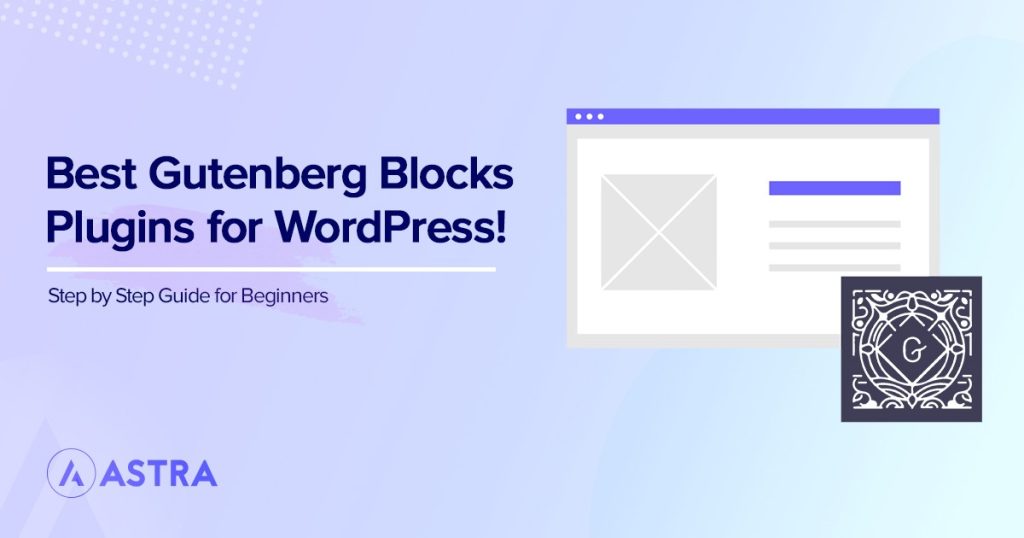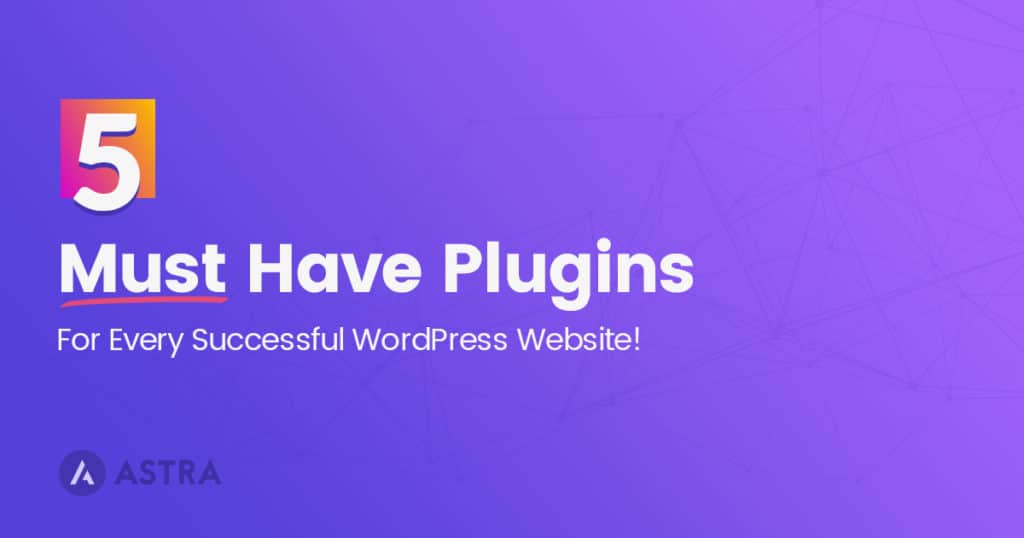Looking for the best Gutenberg block plugins for WordPress?
Introduced with the WordPress 5.0 release in December 2018, the Gutenberg block editor brings in a whole new modular approach to creating a website.
The classic WordPress (TinyMCE) editor added all your content to a unified text box. Gutenberg offers blocks for every element on your page that you can easily drag and drop.
Want to add a heading? There’s a heading block for that.
Want to add an image? There’s an image block for that.
Want to add some custom HTML? There’s a block for custom HTML too.
You get the picture. There’s a block for anything you want to add to your website!
By default, WordPress offers a range of blocks for adding content to pages. While the list keeps growing, there are around 70 blocks currently available in the Gutenberg editor.
But, with WordPress being WordPress, you can always install third-party plugins that provide way more Gutenberg blocks to speed up your workflow.
And that’s precisely what we have for you in this article.
We’ve listed the 28 best WordPress Gutenberg block plugins that you can install right away to create some fantastic websites.
Let’s explore your options!
What Is the WordPress Gutenberg Block Editor?
First, a bit of background.
The Gutenberg block editor is now the default page editor for WordPress. With the WordPress 5.0 release, the new block editor replaced the classic TinyMCE editor.
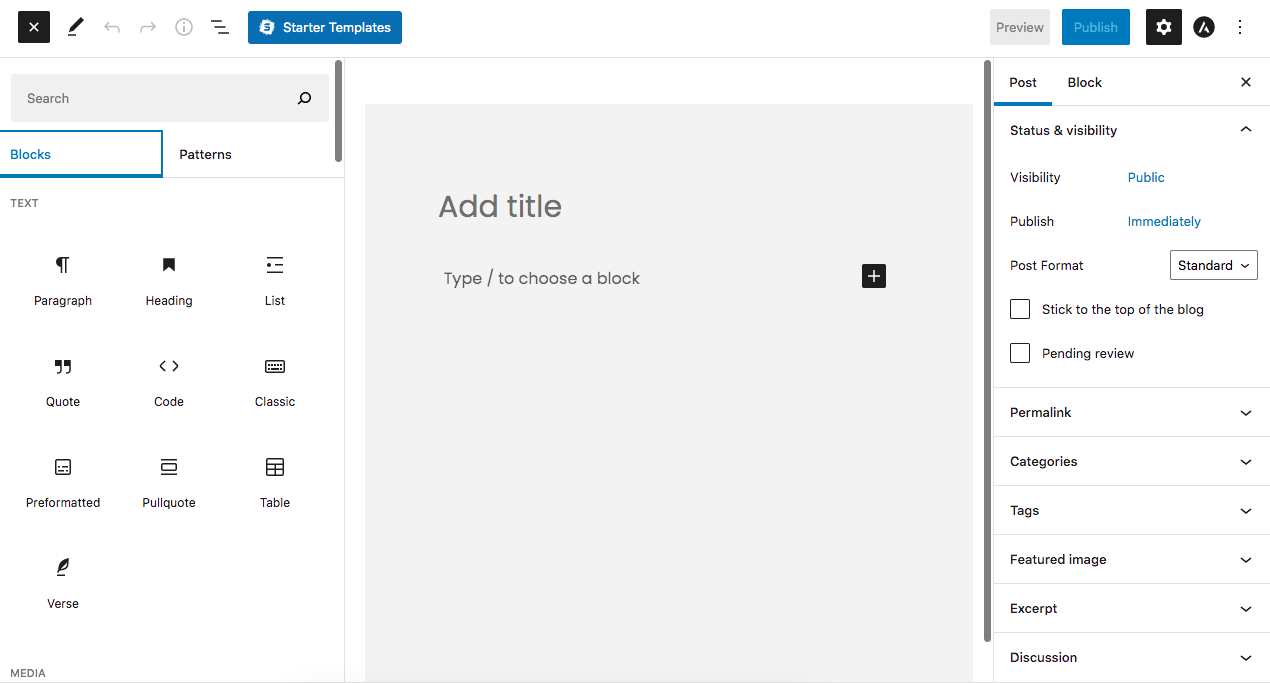
Unlike in the classic editor, where all your content was added into one large content area, the block editor allows you to add each element as an individual block.
Each block also has its own settings that can be easily customized.
Some of the default and frequently used Gutenberg blocks are:
- Heading
- Paragraph
- Image
- List
- Gallery
- Quote
- Video
- Custom HTML
- Table
- Spacer
- Buttons
- Columns
- Separator
- YouTube
Here’s a complete list of all the default Gutenberg blocks.
How Does Gutenberg Improve WordPress?
If you’ve been working on the classic editor, you would have realized that the popular page builders such as Elementor and Beaver Builder offer a lot more features and functionality.
Creating stunning websites is very straightforward when using these page builders. From customizations to background effects and more, there’s a lot you can do using drag and drop functionality.
The block editor still has some catching up to do as far as page builders are concerned. Yet, Gutenberg is a significant improvement compared to the classic editor of old.
Our detailed guides on Gutenberg vs. Elementor and Gutenberg vs. Beaver Builder indicate that websites built using Gutenberg load much faster.
On one hand, you have faster loading sites built using Gutenberg, and on the other hand, you have more visually interesting websites built using page builders.
With constant improvements and exciting updates lined up, Gutenberg is gradually catching up with page builders in terms of its design capabilities.
It won’t be long until it surpasses page builders altogether.
What Benefits Do Blocks Provide?
The Gutenberg block editor offers more features and flexibility when compared to the classic editor.
Here are some benefits of using the Gutenberg block editor.
- The Gutenberg editor is less cluttered, making it easier to write. With more screen space and less stuff in the way, creating pages and posts is more accessible than in the classic editor
- Provides a drag-and-drop editor that allows you to add blocks to your page easily. While there is some catching up to do compared to page builders, it is way better than the classic editor
- Create more stunning layouts without writing a single line of code. When you use Astra Starter Templates, you get your hands on some professionally designed website templates that are Gutenberg-ready!
- Once you’ve included the blocks on your page, you can easily edit and move them around and customize them
- Embed tables, videos, social media, and more without any additional plugins or code
- Creating custom blocks is now much simpler
- Create reusable blocks that allow you to use content across posts or pages
In short, if you like creating content without using fancy page builders, the Gutenberg block editor is for you!
Individual Blocks vs. Block Library Plugins
Before we get into the best Gutenberg block plugins for WordPress, it’s essential to understand the different kinds of Gutenberg plugins.
There are two types of plugins:
- Individual Block plugins (also referred to as Single Purpose Block plugins)
- Gutenberg Block Library
As the name suggests, individual block plugins are those that address a specific purpose.
Examples of this are Schema Pro and WP Portfolio, among several others. They serve a specific purpose, which, in this case, is helping you add schema markup and adding a portfolio to your website.
On the other hand, Gutenberg block library plugins offer you a variety of additional blocks. It’s like one plugin doing the job of several plugins without you having to install multiple plugins.
An example of the Gutenberg block library plugin is Spectra. It offers lots of blocks and features you can use without having to install individual plugins.
The 28 Best Gutenberg Block Plugins for WordPress
Here is a list of the best Gutenberg block plugins for WordPress:
- Spectra
- Toolset Blocks
- Genesis Blocks
- Atomic Blocks
- Stackable
- Getwid
- PublishPress Blocks
- Guteblock
- Ultimate Blocks
- JetEngine
We’ve tried and tested the best Gutenberg block plugins for WordPress. These include both individual block plugins, as well as block library plugins.
1. Spectra

Spectra extends the default editor with a library of powerful Gutenberg blocks to help speed up your workflow. Spectra offers several unique and creative blocks that help you design pages and posts without writing a single line of code.
Pick your favorite blocks, such as infobox, post layout, team, price list, social share, among others. Then customize those blocks to suit your requirements.
Additionally, when you install the plugin, you get access to some professionally designed website templates built using the Astra theme, Gutenberg, and Ultimate Addons.
Pros of Spectra:
- 25+ creative and powerful blocks
- 65+ free pre-built starter templates
- Built for speed and performance
- Flexible and easy to use
- Completely customizable
Cons of Spectra:
It’s hard to find something wrong when we’ve developed such a fantastic plugin. That being said, we can always have more blocks added to the list!
Spectra Pricing
Spectra is entirely free.
2. Toolset Blocks
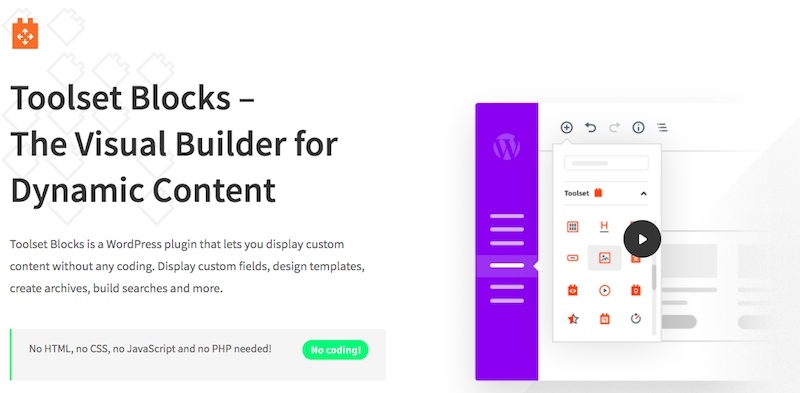
Toolset Blocks is a WordPress Gutenberg blocks plugin that lets you create custom websites just as you want, without writing any code.
With Toolset’s WordPress Block Editor, you can visually design templates for your custom post types, display custom fields, build searches, and do a lot more.
It offers you a wide range of design blocks, such as content template, rating, grid, social share, gallery, star rating, slider, countdown and a wide range of useful features.
Pros of Toolset Blocks:
- Works on any WordPress theme
- Design dynamic templates without writing any code
- Drag and drop editor
- 100% customizable
- Create queries effortlessly and display them anywhere on your website
- Create custom searches for any content type
Cons of Toolset Blocks:
- Involves a slight learning curve
Toolset Blocks Pricing
Toolset is a premium plugin and starts at $69 per year for a single site license.
3. Genesis Blocks
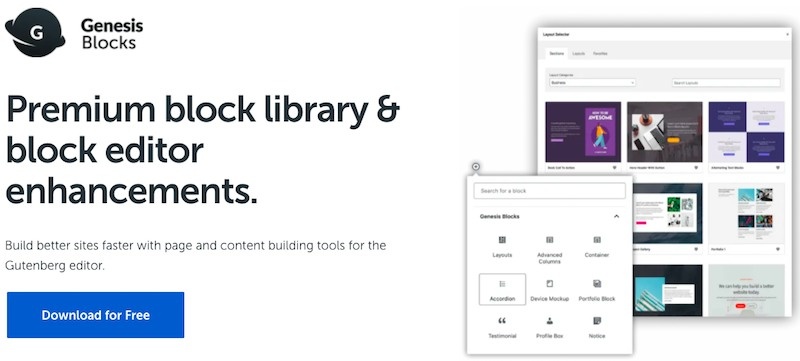
Genesis Blocks is a great collection of blocks for the Gutenberg editor. In addition to the library of blocks, Genesis Blocks provides several page sections and full-page layouts, all of which are accessible from your block editor.
When you install Genesis Blocks, you get access to 15 new blocks and 4 pre-built page layouts, all optimized for performance. Blocks include section and layout, advanced columns, pricing, post grid, testimonial, inline notice, and more.
Pros of Genesis Blocks:
- Easy to install and use
- 15 new blocks
- Every block, section, and layout can be easily customized
- Compatible with all WordPress themes
Cons of Genesis Blocks:
- Limited number of blocks. The Pro version adds more but it doesn’t come cheap
Genesis Blocks Pricing
You can use Genesis Blocks for free. For additional features, you’ll need to upgrade to Genesis Pro that costs $360 per year.
4. RioVizual
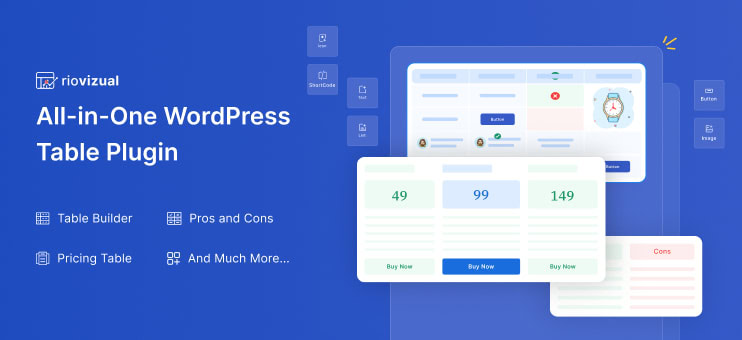
RioVizual is an all-in-one WordPress table plugin built for the Gutenberg block editor. It helps you create fully responsive, content-rich tables directly inside Gutenberg. From comparison and pricing tables to product, data, and pros & cons tables — RioVizual offers dedicated blocks for every table type, complete with deep customization options.
Need more flexibility? Use RioVizual’s standalone visual builder to design advanced tables and embed them anywhere in WordPress using a shortcode. Whether you’re using Gutenberg, the Classic Editor, Elementor, or any other page builder, RioVizual integrates seamlessly.
With its intuitive drag-and-drop interface, 20+ table elements, and pixel-level design control, RioVizual offers a professional-grade table-building experience — without code or complexity.
Plus, you can start from scratch or choose from 65+ pre-designed table templates to speed up your table creation in WordPress.
Pros of RioVizual:
- Visual drag-and-drop table builder
- Dedicated blocks for every table type
- Works with any editor via shortcode
- 20+ flexible table elements
- Fully responsive and SEO-optimized
- Extensive customization controls
- 65+ ready-made table templates
Cons of RioVizual:
- No lifetime license option (currently annual plans only)
RioVizual Pricing
RioVizual offers a free version with essential features. There is also a premium version that starts at $49 per year for a single site.
5. Stackable
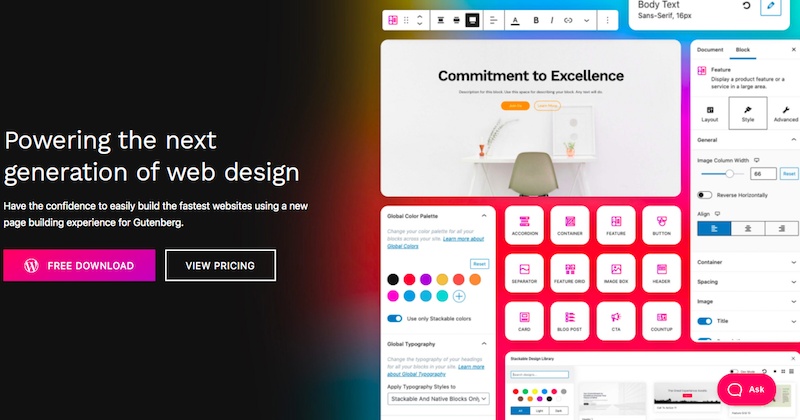
Stackable is a lightweight Gutenberg block plugin that helps build dynamic websites. Use any of the custom blocks, ready-made designs, global settings, and advanced customization options without impacting website performance.
With Stackable, you get 27+ flexible and feature-rich custom blocks that can be used on any website without writing code. Some of the blocks include container, separator, posts, feature grid, icon list, call to action, and many others.
Pros of Stackable:
- User-friendly UI
- 27+ feature-rich custom blocks
- 355+ ready-made block designs (including premium ones)
Cons of Stackable:
- Stackable packs in a lot. So, if you are looking for a plugin that offers only Gutenberg blocks, Stackable might not be your best bet
Stackable Pricing
Stackable is available for free. There is also a premium version that starts at $49 per year for a single site.
6. Getwid
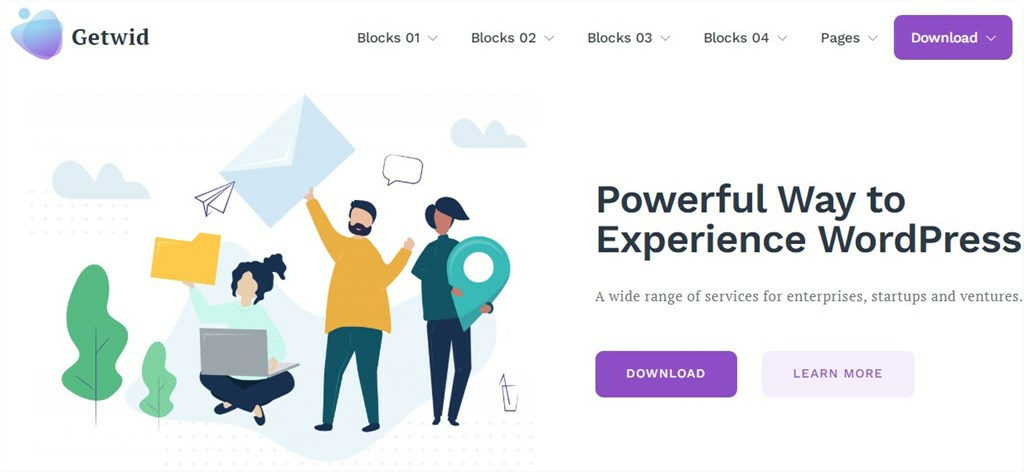
Getwid enhances your WordPress website with 40+ lightweight and flexible Gutenberg blocks. Some of the most popular include an image slider, banner, accordion, price box and advanced table. You can download and insert them into different site sections at zero cost.
With Getwid, you also get access to an extensive collection of 35+ pre-crafted templates. It takes just a few clicks to customize colors, fonts, sizes, and other options. The result is a simple way to build a website using the block editor
Pros of Getwid:
- 40+ free blocks for the WordPress block editor
- 35+ readymade templates
- Optimized for fast performance
- Clean code
- Blocks adjust to the style of your WordPress theme
Cons of Getwid:
- Some blocks don’t have a lot of customization options
Getwid Pricing
Getwid blocks are completely free and can be downloaded from the WordPress directory.
7. PublishPress Blocks
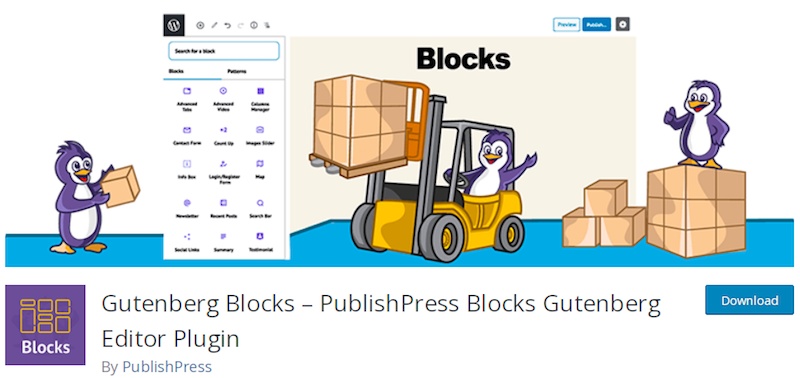
PublishPress Blocks is a feature-rich plugin that offers several fantastic blocks to build professional websites. The blocks provide several layout options, buttons, sliders, icons, maps, image galleries, testimonials, and more.
Among the several fantastic blocks that PublishPress offers, the Content Display block provides a lot. You get to create blog layouts, display posts from a specific author and custom post types. You also get to enable or disable blocks for particular users.
Pros of PublishPress Blocks:
- User-friendly, lightweight, and easy to use
- Power Content Display block to customize your content and apply filters such as by author, category and tag
- Set user permissions allowing you to enable/disable blocks for specific users
- Create flexible and beautiful layouts that are responsive across all devices
- Includes WooCommerce blocks to showcase your store products
Cons of PublishPress Blocks:
- The free version displays ads and the PublishPress branding. If you want this removed, you’ll have to get behind a subscription plan, which doesn’t come cheap!
PublishPress Blocks Pricing
PublishPress Blocks is free to use. There’s always a premium version that offers additional blocks and removes the PublishPress ads and branding.
The entire PublishPress suite starts at $129 per year and can be used on a single website.
8. Guteblock

Guteblock is an easy-to-use WordPress plugin that boosts Gutenberg with 30+ professionally designed blocks. Whether building an entire website or a landing page, Guteblock makes it easy with a suite of fantastic blocks.
Some of the blocks include post grid, team members, testimonial, container, separator, CTA, author profile, social share icons, blockquote, button, among many others.
Pros of Guteblock:
- 30+ creative blocks that can be easily customized
- Unique styles and settings are available for each block
- Responsive and optimized for search engines
- Combine different blocks in a single row by using the container block
- More options to style the drop cap letter
Cons of Guteblock:
- Guteblock hasn’t been updated in a while and may have compatibility issues with the latest versions of WordPress
Guteblock Pricing
Guteblock is free and can be downloaded from the WordPress plugin repository.
9. Ultimate Blocks
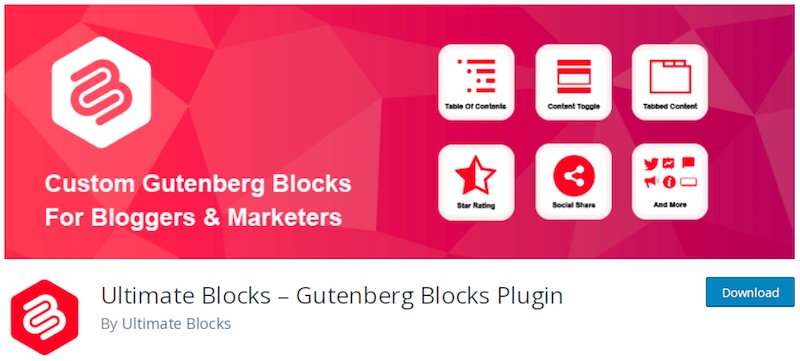
Ultimate Blocks is a popular Gutenberg block plugin that makes it easy to build websites and speed up your workflow. With 18+ awesome blocks, such as review, table of contents, call to action, image slider, click to tweet, progress bar, and more, you can create engaging content with Ultimate Blocks.
A unique feature of Ultimate blocks is the option to enable and disable blocks. For instance, if there’s a block you feel is not required, simply disable it. This way, you keep your website lightweight. The next time you want to use a feature, simply enable it.
Pros of Ultimate Blocks:
- Powerful and easy to use
- Completely customizable
- Lightweight and optimized for speed
- A unique enable/disable individual blocks feature
- SEO friendly
Cons of Ultimate Blocks:
- Limited number of blocks
Ultimate Blocks Pricing
Ultimate Blocks is available as a free download.
10. JetEngine
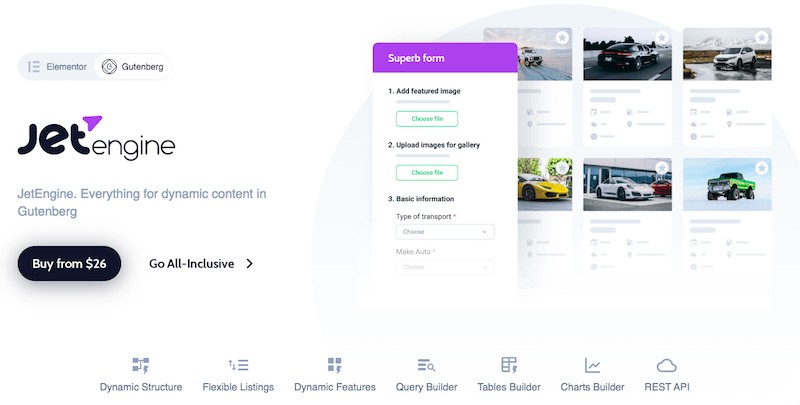
JetEngine is a premium plugin that helps you build dynamic websites using the Gutenberg editor. Creating dynamic structures, layouts, and lists for your website based on custom queries is made super simple with JetEngine. All this without writing any code.
JetEngine is also compatible with popular plugins such as WooCommerce, RankMath, and Yoast.
Pros of JetEngine:
- 13 dynamic Gutenberg blocks
- Create dynamic website structures code free
- Apply custom styles to the blocks
- Attractive listing grid layouts
- Seamlessly integrates with third-party plugins
Cons of JetEngine:
- Limited number of blocks
JetEngine Pricing
JetEngine is a premium-only plugin and will cost you $26 annually for a single site.
11. Easy Blocks Plugin For Gutenberg Editor
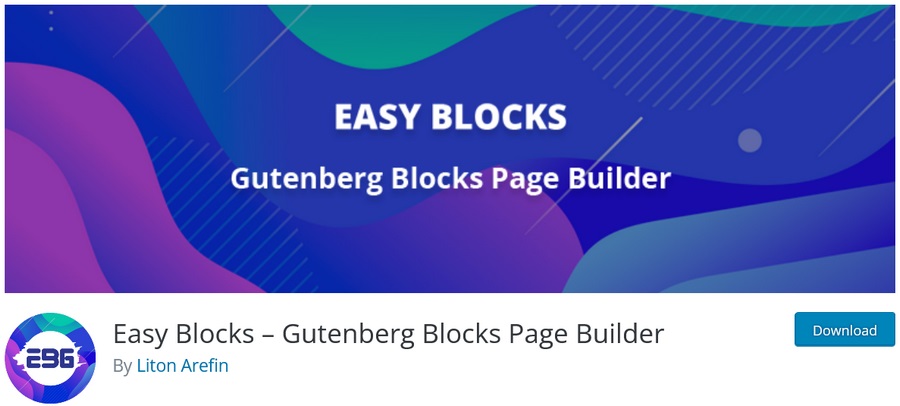
Easy Blocks is a reasonably new Gutenberg block plugin that you can easily install on your WordPress website. Currently, the plugin has 20+ blocks and a lot more in the pipeline.
Using Easy Blocks, you can easily create multiple column variations in a single row, drag and drop column sizes, display numerous testimonials and include Instagram posts. Easy Blocks is a simple yet effective solution, whether you are creating a website from scratch or customizing an existing one.
Pros of Easy Blocks Plugin:
- 20+ different blocks
- Completely customizable
- Lightweight and loads fast
- Excellent support team
Cons of Easy Blocks Plugin:
- No recent updates
- Limited blocks
Easy Blocks Plugin Pricing
Easy Blocks is free.
12. GutenBee
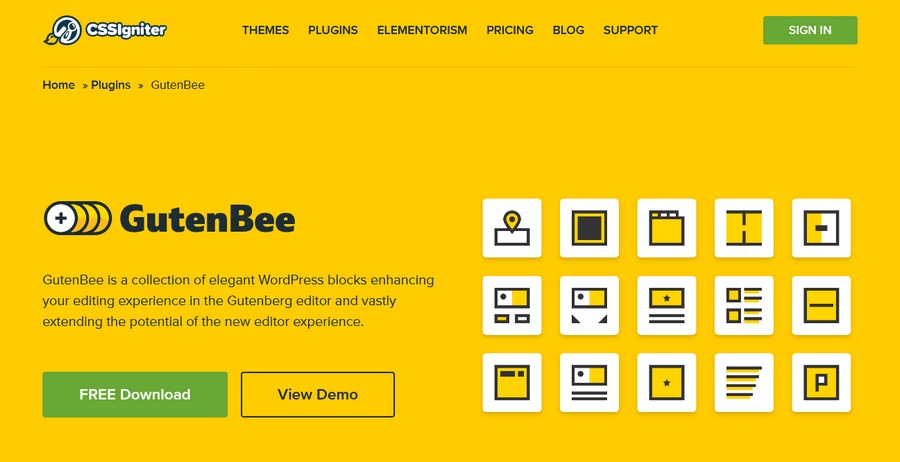
GutenBee is a collection of 25+ WordPress blocks that enhances possibilities with the Gutenberg block editor. Some of the popular ones include the button block, container block, post types block, among others.
GutenBee allows you to disable blocks that you don’t need, which is a neat touch. By default, they all come enabled but you can toggle them off easily. The blocks also offer extensive customization options and are completely responsive.
Pros of GutenBee:
- Easy to set up and use
- 25+ elegant blocks
- Lightweight and optimized for speed
- Option to enable/disable blocks
- 100% customizable
- Responsive
Cons of GutenBee:
- Technical support is available only via an active subscription
GutenBee Pricing
GutenBee is free and can be downloaded from the WordPress plugin repository.
13. Otter Blocks
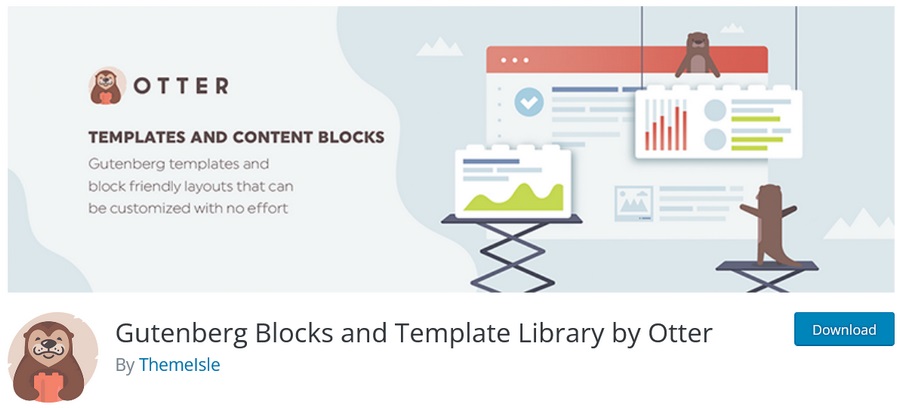
Otter is a popular WordPress plugin with 20+ excellent blocks to create innovative layouts using the Gutenberg block editor. Whether it’s a personal blog or full-fledged online store, Otter can help create some impressive layouts.
Some blocks include advanced heading block, slider block, accordion block, Google Maps block, masonry gallery block, Lottie animation block, and many more.
In addition to the library of blocks, Otter comes with 50+ templates that you can use to build professional sites quickly. Each block can be tweaked and customized any way you want.
Pros of Otter Blocks:
- 20+ awesome blocks
- Lightweight and doesn’t impact page speed
- 50+ professional templates
- Completely customizable
- Mobile responsive
Cons of Otter Blocks:
- While the forums are there to help you out, you should expect a slight delay as far as support is concerned
Otter Blocks Pricing
Otter is available for free.
14. Caxton
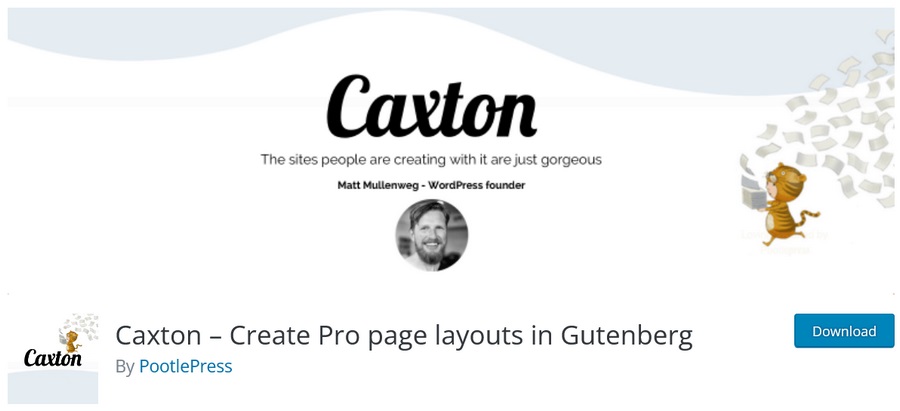
Caxton is a collection of blocks that makes it easy to create beautiful and professional pages using the Gutenberg block editor. From layout blocks and shape dividers to post grid, CTA, icons, and a lot more awesome blocks, Caxton has you covered.
Using Caxton, you can unleash your creativity by adding creative layouts, background, and shape dividers to your pages. Caxton also gets a thumbs up from the WordPress founder, Matt Mullenweg.
Pros of Caxton:
- Easy to get started
- Add impressive background effects such as parallax
- Add beautiful transitions between the blocks
- Unique shapes and divider blocks
- Advanced mobile controls
- Excellent support
Cons of Caxton:
- Limited number of blocks
Caxton Pricing
Caxton is free to download.
15. Kadence Blocks
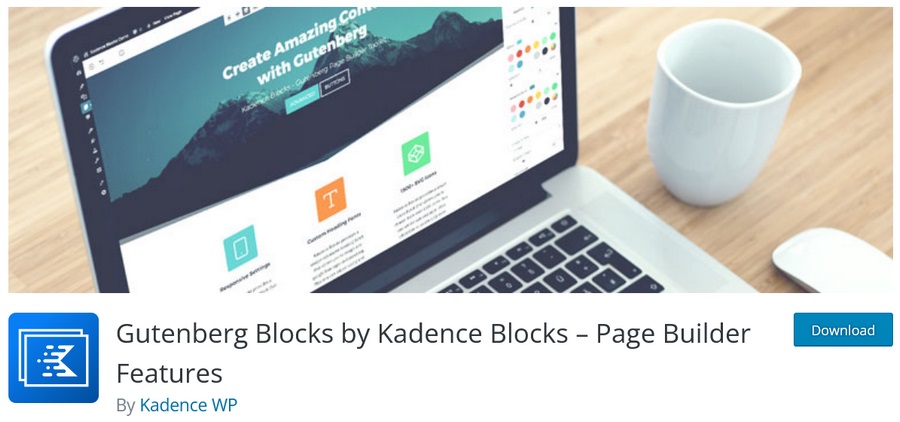
Kadence Blocks is a very popular Gutenberg block plugin for WordPress. It comes from the same team behind the Kadence theme. Kadence Blocks adds 15 new custom blocks to extend the capabilities of Gutenberg, allowing you to create some stunning websites.
Using the Kadence Blocks library of prebuilt templates, you can launch your website quickly without writing a single line of code. Simply browse by category and drag the content pieces into your pages. Then tweak it to match your website requirements.
Pros of Kadence Blocks:
- Lightweight and loads only what is required
- Completely customizable
- Responsive design
- 900+ Google fonts and 1500+ SVG Icons
- Display block settings based on user roles
- Extensive knowledge base and documentation
Cons of Kadence Blocks:
- Limited blocks in the free version
- Considering you have several free options that offer way more blocks, Kadence Pro doesn’t seem to be a great option
Kadence Blocks Pricing
Kadence Blocks comes with a free version. There’s also a Pro version for additional blocks that starts at $89 per year and can be used on unlimited websites.
16. PostX

PostX is a robust Gutenberg site builder with a wide variety of user-customizable features. It’s a dynamic blog maker featuring a wide variety of readymade blocks – ideal for creating news blogs, magazine blogs, cooking blogs, travel blogs, and more.
It features a site builder with an array of templates for the various pages of your blog. With just a few clicks, you can easily customize these templates to your liking.
Every template is a collection of blocks that allow you to make adjustments – enabling you to deliver the highest quality experience to your users.
Pros:
- Fast and light – optimized for performance
- 250+ blog patterns ready for use with one-click import
- 40+ blocks for creating dynamic blog sections
- 75+ pre-made templates to use with the builder
- SEO addon support for post optimization
Cons:
- A limited number of templates are available with the free version.
PostX Pricing
PostX costs from $49 per year up to $179 per year depending on how many site licenses you need.
17. CoBlocks
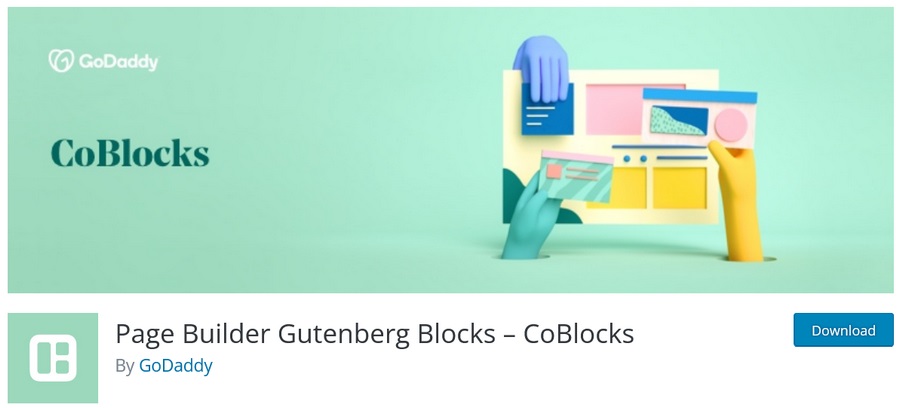
CoBlocks is a very popular lightweight WordPress plugin that extends the experience of your Gutenberg block editor. The plugin features an innovative block system allowing you to create fantastic web pages effortlessly.
Among the several excellent blocks that CoBlocks offers, the Row and Column block allow you to add dynamically generated content. You also get to add beautiful dividers to split up your content using the Shape Divider blocks.
Pros of CoBlocks:
- Powerful and lightweight plugin
- 30+ amazing blocks
- Use their typography control panel to customize your fonts
- Compatible with all WordPress themes
Cons of CoBlocks:
- Compatibility issues may arise with specific themes and plugins
CoBlocks Pricing
CoBlocks is 100% free.
18. Qubely
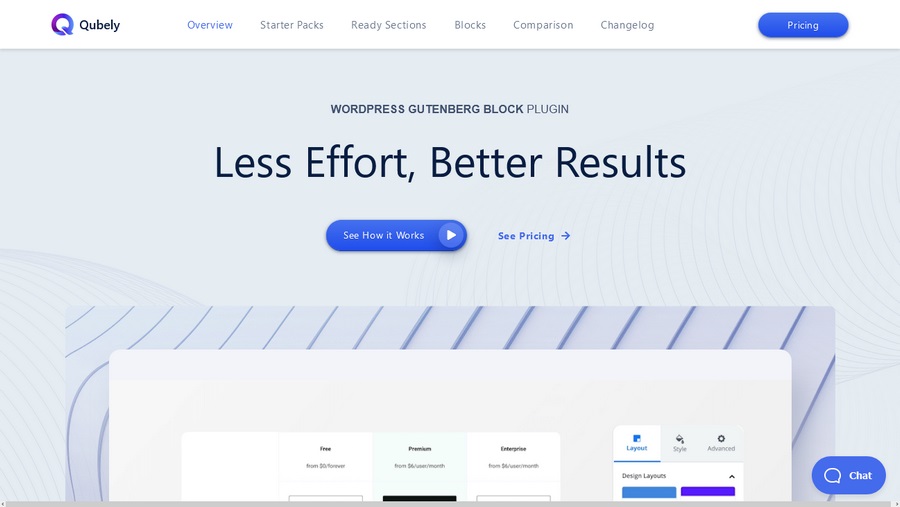
Qubely is a Gutenberg block plugin that offers 24 highly customizable premium blocks for your block editor. Additionally, it provides 150+ predefined sections and a modern layout, allowing you to come up with creative and awesome page layouts.
You can customize your designs using the plugin’s advanced functionality. Whether it’s a simple layout or a complex one, Qubely allows you to create them quickly. The row-column structure will enable you to have as many as six columns in a single row.
Pros of Qubely:
- User-friendly
- 24 custom blocks
- 150+ ready section designs (available in the Pro version)
- 100% customizable
- Mobile responsive
Cons of Qubely:
- Priority support available only for the Pro version users
Qubely Pricing
Qubely is available for free. The Pro version starts at $39 per year for a single site.
19. WooCommerce Blocks
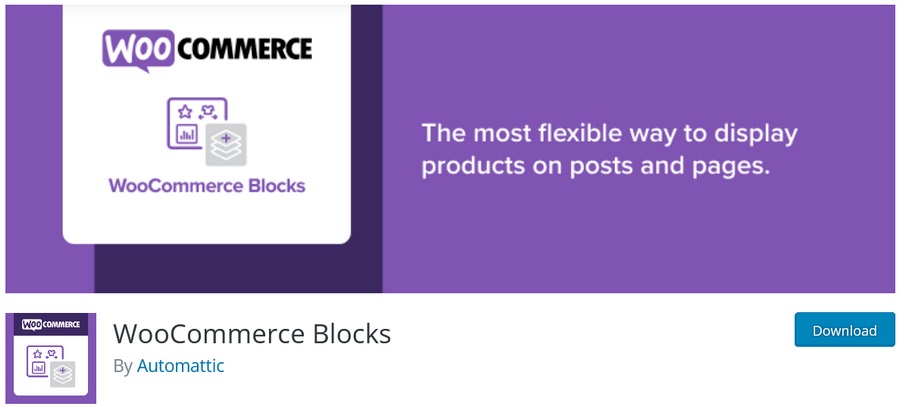
If you want some additional blocks to help display the products on your online store, WooCommerce Blocks is tailor-made for you. Whether communicating your store products on a landing page, a custom shop page, or even on your pages and posts, WooCommerce Blocks makes it super easier.
Some of the blocks include featured product block, hand-picked products block, best selling products block, newest products block, on sale products block, reviews by product, among several others.
Pros of WooCommerce Blocks:
- Easy to set up
- 20+ WooCommerce blocks
- Tweak and customize each block using the individual settings
Cons of WooCommerce Blocks:
- The plugin offers blocks only for your WooCommerce store. For anything else, you’ll need to install another Gutenberg block plugin
WooCommerce Blocks Pricing
WooCommerce Blocks is available for free and can be downloaded from the WordPress repository.
20. Gutenberg Blocks and Page Layout
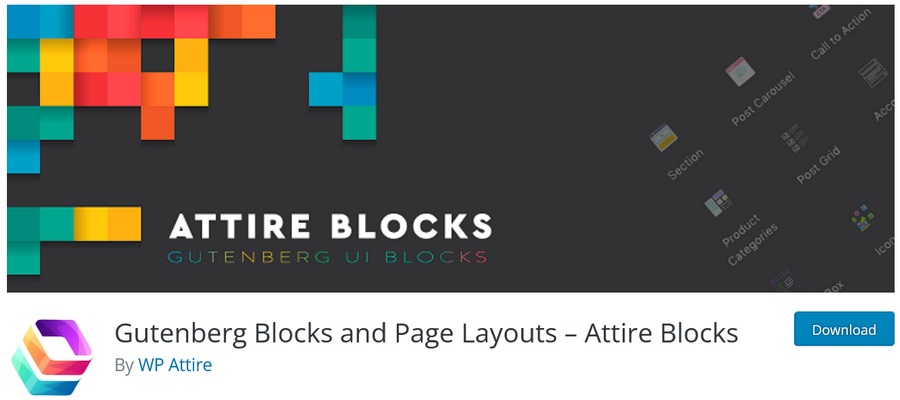
Attire Blocks is a simple yet powerful Gutenberg block plugin that helps speed up workflow while creating pages and posts using the block editor. Attire Blocks also comes with a collection of beautifully designed page layouts to make your website look great.
Some of the blocks include features block, accordion block, buttons block, post grid block, post carousel block, call-to-action block, icons block, among others. It also includes WooCommerce products categories block to display your store products.
Pros of Attire Blocks:
- Uses intelligent code, making it lightweight
- 18 custom blocks
- Easy to implement customizations
- Responsive
Cons of Attire Blocks:
- For dedicated support, you’ll need a subscription plan
Attire Blocks Pricing
Attire Blocks is available for free. They also have a premium edition that provides additional features and prebuilt content.
21. Orbit Fox
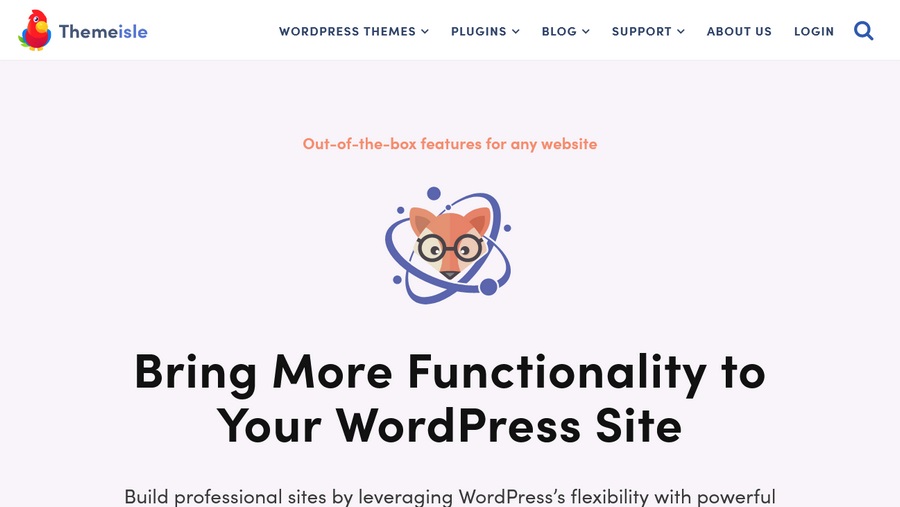
Orbit Fox is a popular multipurpose modular WordPress plugin that offers more than just blocks. In addition to the number of custom widgets and blocks, Orbit Fox offers menu icons, social share modules, free stock photos, one-click import page templates, and a whole lot more.
Orbit Fox provides an easy-to-use admin panel that allows you to choose only the modules that are required. Simply toggle the modules and have the ones you want activated. This ensures you don’t bloat your website with unwanted widgets.
Pros of Orbit Fox
- User-friendly dashboard to enable/disable widgets and modules
- Use a custom font with any theme
- Include scripts to the header or footer of your site without installing a dedicated plugin
- Massive library of 1200+ free images to choose from
- Sharing module that allows you to share on 20+ social networks
Cons of Orbit Fox
- While the plugin offers a lot, it is limited in the number of Gutenberg blocks
Orbit Fox Pricing
Orbit Fox is available for free.
22. Premium Blocks for Gutenberg
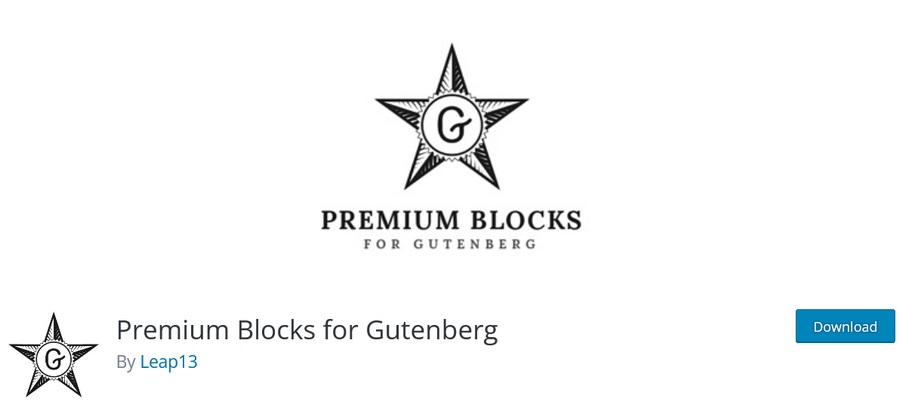
Extend the capabilities of the Gutenberg block editor with Premium Blocks that offers you ten additional blocks. Premium Blocks for Gutenberg helps you create unique and stunning websites using the new editor.
The blocks are built for performance and are RTL-ready. You also have the option to disable the blocks you are not using.
Pros of Premium Blocks:
- Built for performance
- Enable/disable blocks based on your website requirements
- RTL and translation ready
- Compatible with any WordPress theme that’s Gutenberg ready
Cons of Premium Blocks:
- Limited number of blocks
Premium Blocks Pricing
Premium Blocks can be downloaded for free.
23. Gridbuilder WP plugin
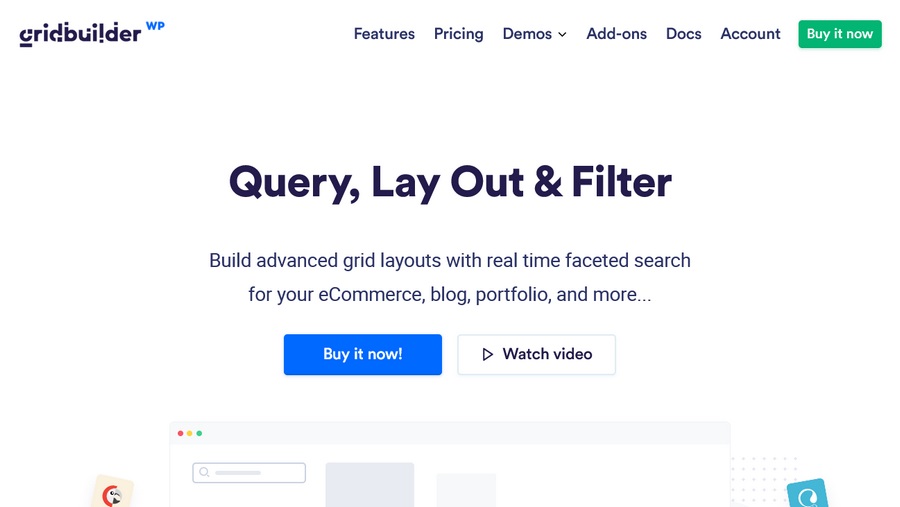
Gridbuilder WP is another plugin that offers more than just blocks. It allows you to create advanced and filterable grid layouts. Choose from over 250 SVG icons, add loading animations, 20+ ready-made grid cards, and a lot more.
You can query all types of content and display them in different layout styles, such as masonry, justified, or even metro. Want to add your layout to a carousel? No problem. With an intuitive drag and drop interface, you can easily customize and design your layouts just the way you want.
Pros of Gridbuilder WP:
- Easy to customize
- 20+ ready-made grid cards
- 15+ facets types
- Compatible with all WordPress themes and third-party plugins
- Supports social sharing
Cons of Gridbuilder WP:
- No free version
- Limited blocks
Gridbuilder WP Pricing
Gridbuilder WP starts at $49 per year for a single site license.
24. Redux Gutenberg Blocks
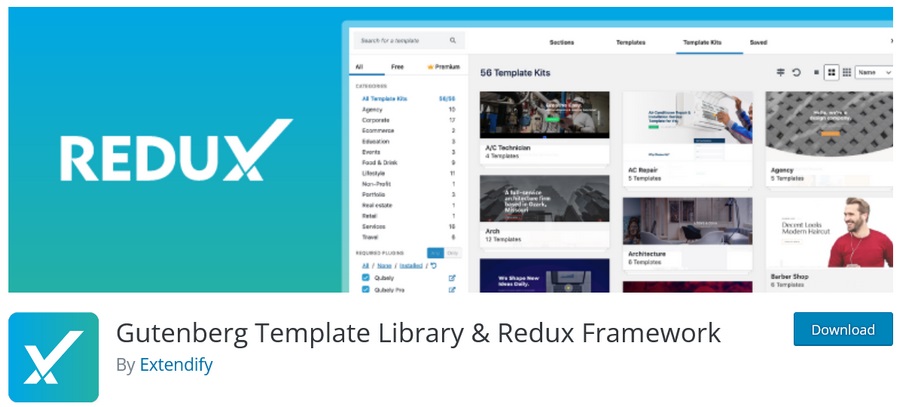
Redux Gutenberg Blocks is a very popular plugin with over a million active installations. Using the plugin, you can supercharge your block editor with an impressive library of blocks and templates that allows you to go up and running with your website in no time at all.
Create pages quickly using the pre-designed patterns and templates. Simply browse through a category or collection and customize it to suit your needs. Redux Gutenberg Blocks is compatible with just about any WordPress theme too.
Pros of Redux Gutenberg Blocks:
- Lightweight
- Fully customizable
- 1,000+ templates that you can add to your site
- Works with all WordPress themes
- Built-in block patterns support
- Clean developer-friendly code
Cons of Redux Gutenberg Blocks:
- Packed with a lot of features
- Limited Gutenberg blocks
Redux Gutenberg Blocks Pricing
Redux Gutenberg is available for free on the WordPress repository.
25. Gutenberg Block Editor Toolkit
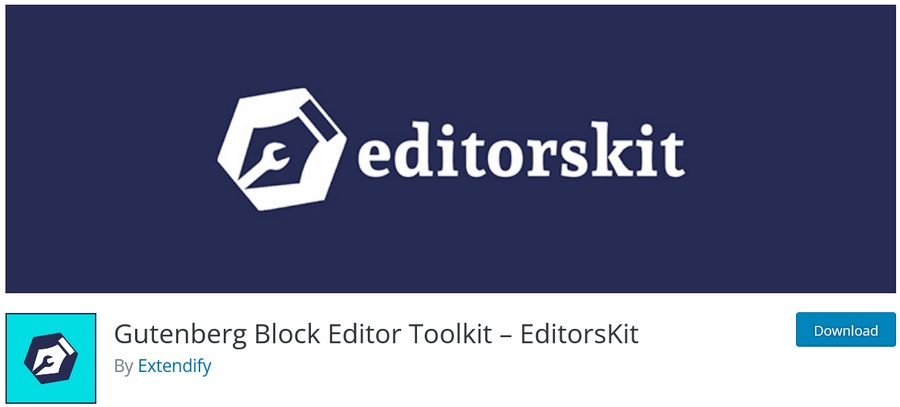
Gutenberg Block Editor Toolkit provides a set of page building blocks and toolkits for the Gutenberg editor. It offers you better control over Gutenberg, way more formatting and styling options, and improves overall workflow.
Want to control which block gets displayed on desktop and what gets hidden on mobile devices? Well, EditorsKit helps you control just that with an easy toggle option for each block. You also get to decide which blocks get displayed based on the user’s logged-in state.
Format your text with options such as text highlights, superscript, subscript, justify alignment, markdown formatting, and several more. Not to mention, there are several image formatting options as well.
Pros of Gutenberg Block Editor Toolkit:
- Better text formatting options
- Show/hide blocks based on device
- Include reading time for your posts and pages
- Change text alignment based on device
- Impressive UI to enhance the user experience
- Extensive template and pattern library to choose from
Cons of Gutenberg Block Editor Toolkit:
- Limited number of Gutenberg blocks
Gutenberg Block Editor Toolkit Pricing
Gutenberg Block Editor is available for free.
26. Kioken Blocks
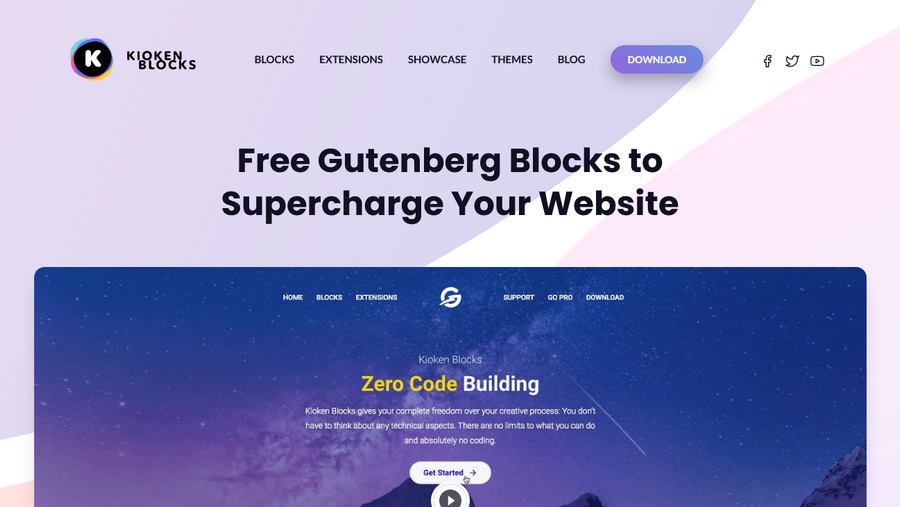
Kioken Blocks is a fantastic suite of Gutenberg blocks that help you create a beautiful and responsive website in a matter of minutes. The plugin also offers tools such as custom typography, custom margin spacing, inline text color formatting, and more.
In addition to the fantastic blocks, Kioken Blocks offers several pre-designed templates that you can use to create stunning web pages faster.
Pros of Kioken Blocks:
- 17 Gutenberg blocks
- 15+ templates (Pro version has 200+ more)
- 7500+ icons
- Completely customizable
- Responsive
Cons of Kioken Blocks:
- Kioken Blocks hasn’t been updated in a while
Kioken Blocks Pricing
Kioken Blocks is free and can be downloaded from the WordPress repository.
27. Lazy Blocks
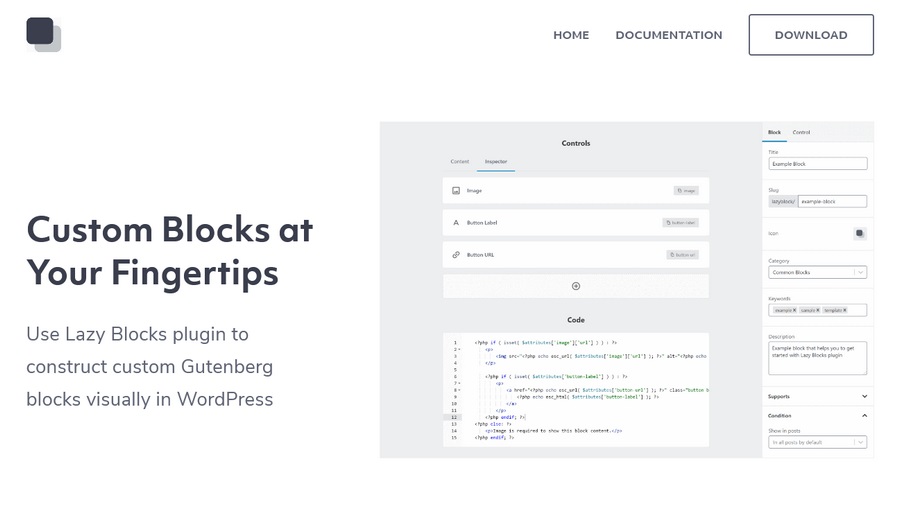
Lazy Blocks is a little different from the rest of the options we’ve covered so far. It allows you to create custom blocks visually for the Gutenberg editor. You can add controls to your blocks, write block output using HTML or PHP code, or even create custom meta fields.
Additionally, you can also create post templates with predefined blocks.
Pros of Lazy Blocks:
- Easily create custom blocks
- 20+ controls to make your blocks
- Developer friendly
- Create custom templates for posts/pages
- Extensive documentation
Cons of Lazy Blocks:
- Lazy Blocks is not your standard Gutenberg Block plugin where you install and start using the blocks
Lazy Blocks Pricing
Lazy Blocks is available for free.
28. Tableberg
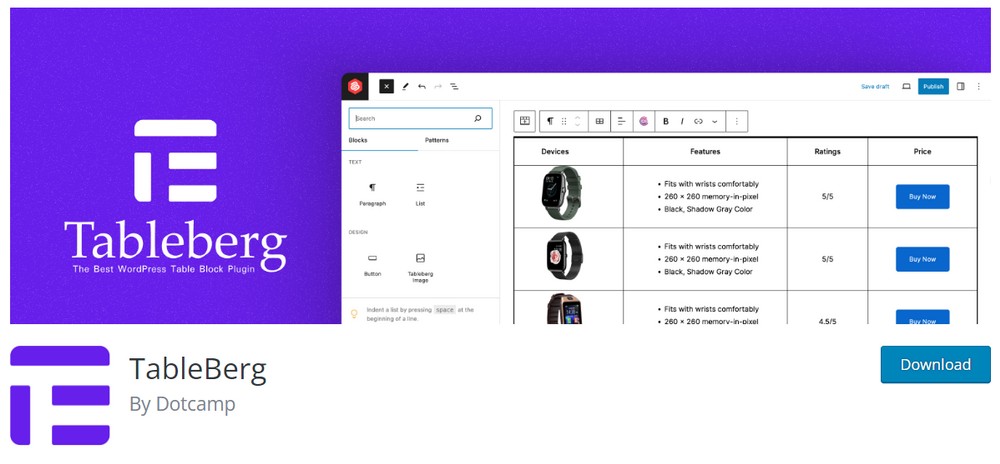
Tableberg is a valuable addition to the WordPress block editor, designed for users who need efficient table creation and customization. It offers a user-friendly interface with adjustable headers, footers, and table alignment.
The plugin’s color customization options for table elements make it a versatile tool for enhancing the visual appeal of data presentations in WordPress.
You can also change the border sizes and color of the tables. It offers all the missing features of the default table block.
Pros of Tableberg:
- User-friendly interface for creating tables
- Adjustable headers and footers
- Color customizations
- Responsive design
- Integrates with the block editor
Cons of Tableberg:
- Lack of some complex functionalities
Tableberg Pricing
Tableberg is completely free.
How Do I Use Gutenberg Plugins?
Gutenberg comes with WordPress and is now the default editor. However, there are also plugins that add new Gutenberg blocks to supplement what’s already there.
Let’s install one of them and see how it works.
Here, we will be installing Spectra. It’s a free Gutenberg plugin that adds blocks, templates and tools to the new editor.
Using a Gutenberg plugin is similar to any other plugin.
Step 1: Install and Activate Spectra
To install the plugin:
- Head to Plugins > Add New from your site dashboard
- Search Spectra on the plugin search box
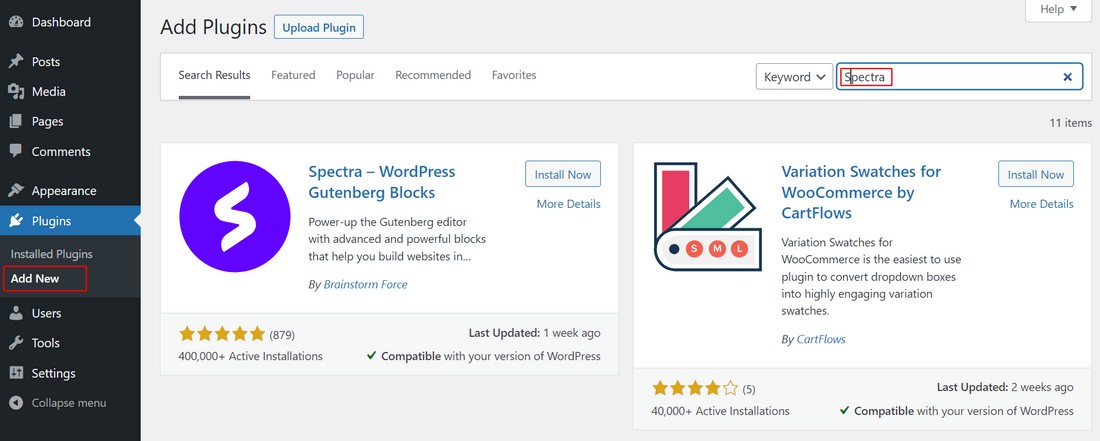
- Install and activate the plugin
That’s it. You have successfully installed and activated the plugin on your website!
Step 2: Use Spectra
Upon activating the plugin, you will be directed to the Spectra page, which you can also find by heading to Settings > Spectra.
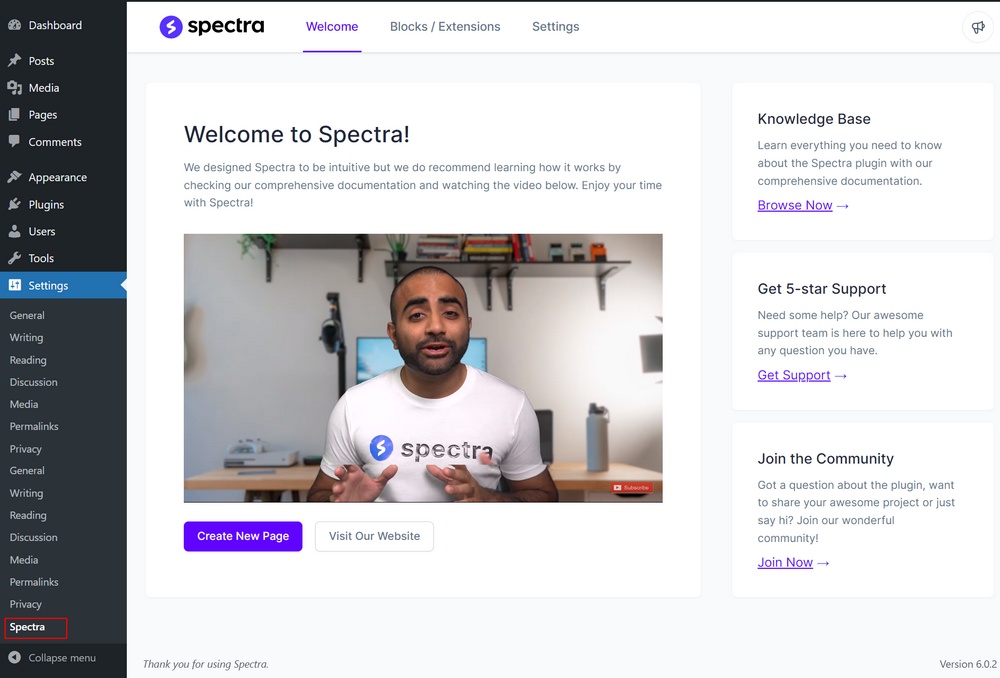
You can see a detailed video tutorial on how to use the plugin.
Spectra is very easy to use but has a knowledge base and a community using the plugin where you can ask questions or share anything you want.
The next tab on the page is Blocks / Extensions.
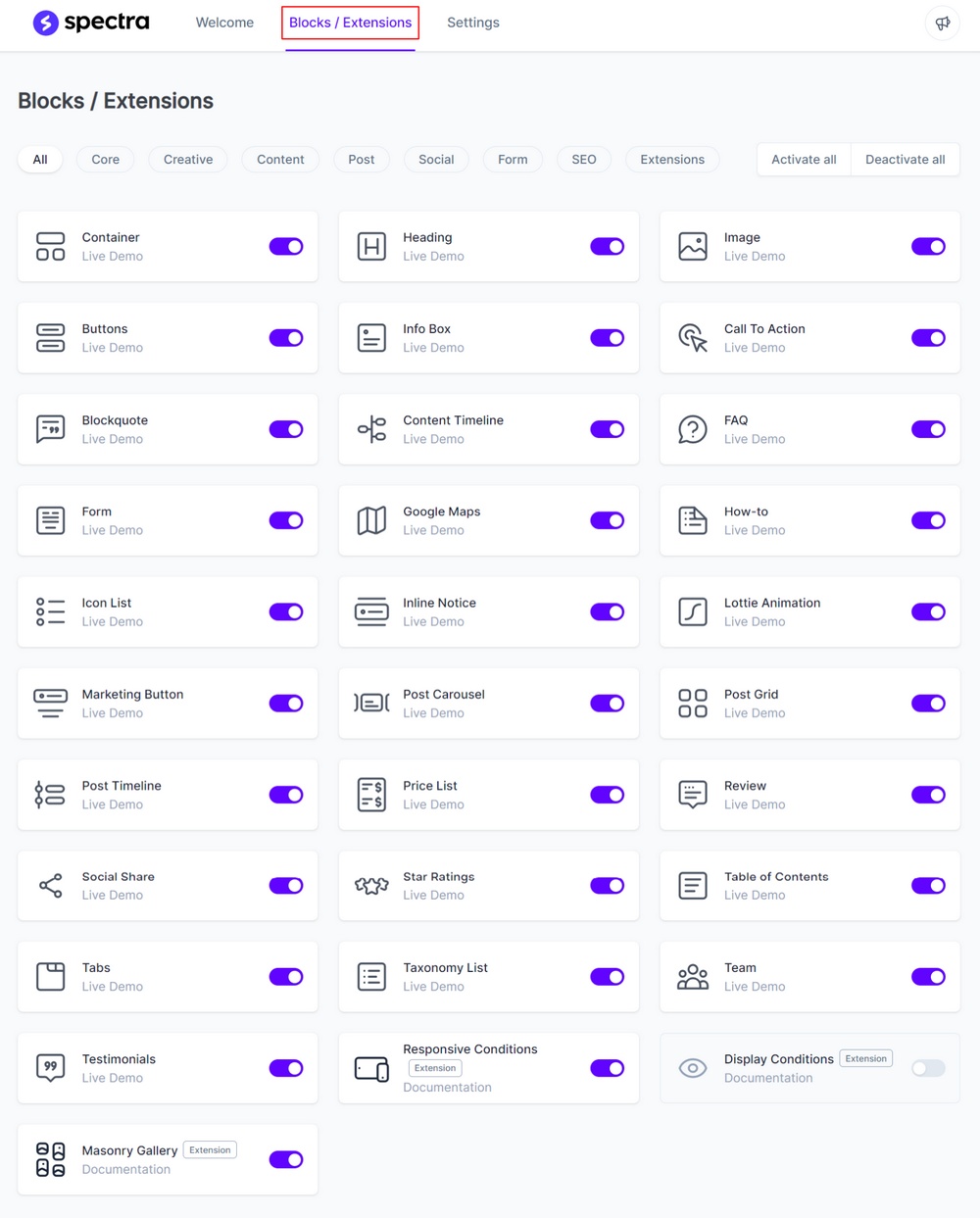
Here, you can enable or disable the blocks or extensions. Upon enabling them, you can find the block later when creating a new page, whereas disabling them will hide it from the block list.
The next tab is Settings.
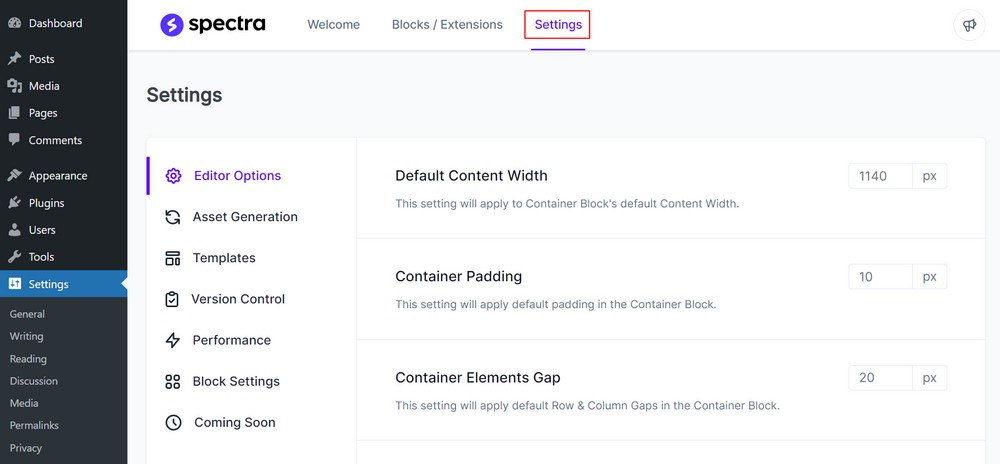
Here, you can preview all the options and set everything up just the way you like.
You can start using Spectra by clicking the Create New Page button on the welcome page.
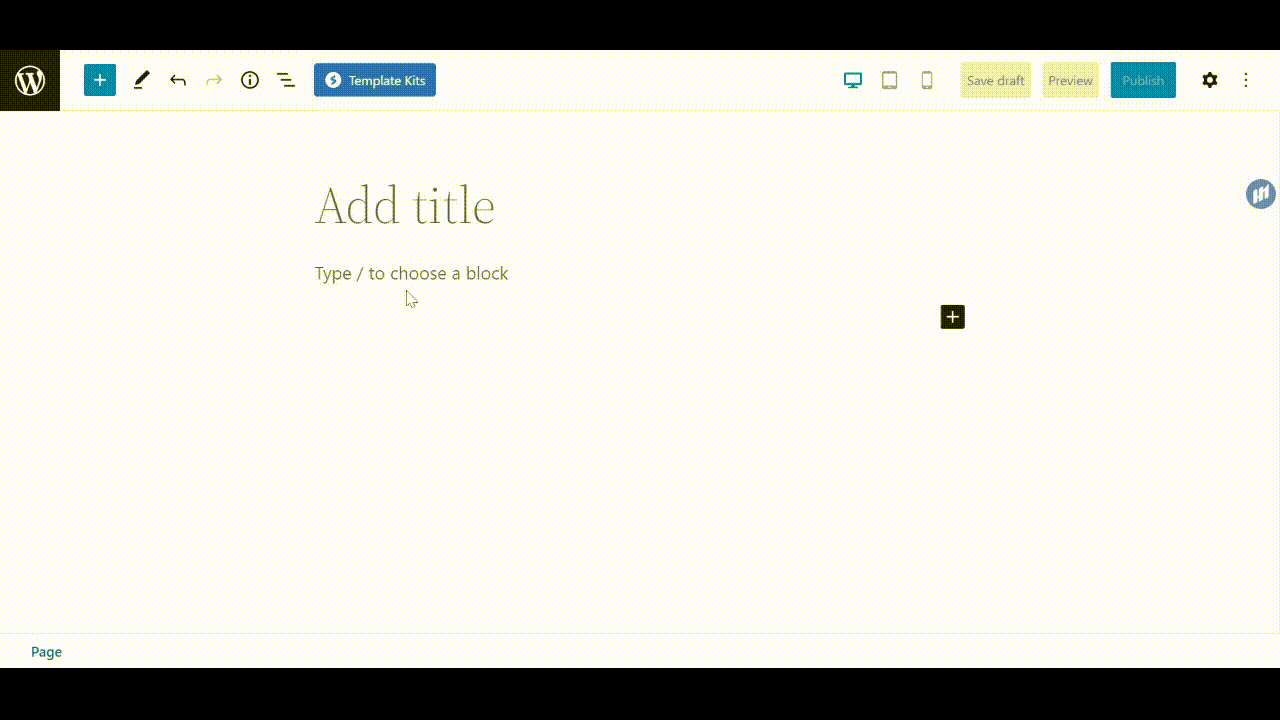
Upon clicking the ‘+’ icon, you’ll notice an entirely new set of blocks added to the existing library under Spectra Blocks.
- Drag and drop a block onto the page.
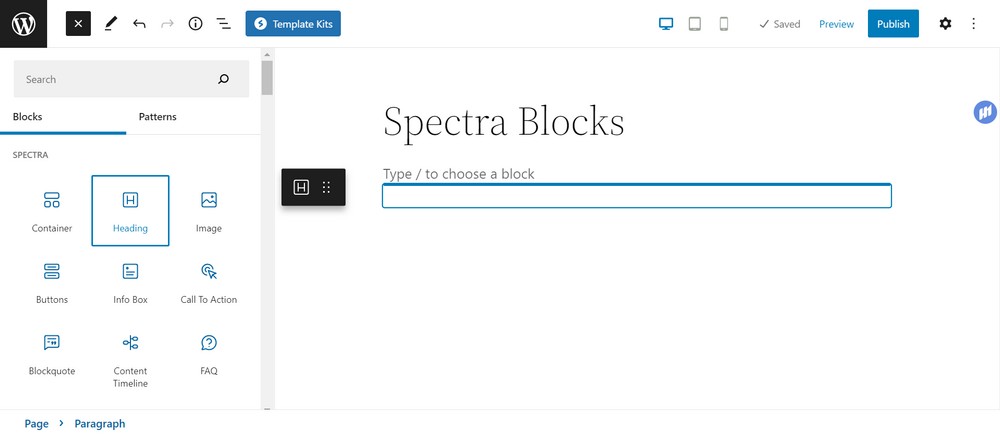
- Add as many blocks as you need and design your page.
Once complete, you can publish the page and move on to the next.
And that’s how simple it is to install and use a Gutenberg plugin in WordPress!
Gutenberg Block FAQs
While we’ve covered a lot in this article, we’ve also addressed a few frequently asked questions that our users have regarding Gutenberg.
We’ve covered most of these above, but it’s worth mentioning them again.
Which Gutenberg Block Plugin Have You Installed?
If you are working on WordPress, Gutenberg should be second nature to you. After all, it’s now the default page editor used to create your pages and posts.
Gutenberg is a significant step forward from the earlier classic editor and creating content using the modular approach is a whole lot easier. Simply select a block you’d like to add, tweak the settings, and go about creating your pages.
However, the default blocks may limit your creativity beyond a certain point. And that’s when you’d want additional Gutenberg blocks. To not only build creative pages but also speed up your workflow.
Fortunately, there are several Gutenberg block plugins for WordPress. The best of which have been covered in this article.
We’d like to hear from you now. Which of the above Gutenberg block plugins have you installed in your WordPress site? Or is there one that we missed? Let us know!

Abhijeet Kaldate is the co-founder and CRO of Brainstorm Force. With a keen eye for detail and a knack for getting things done, Abhijeet oversees the company's operations, managing key areas such as HR, marketing, design and finance.
Disclosure: This blog may contain affiliate links. If you make a purchase through one of these links, we may receive a small commission. Read disclosure. Rest assured that we only recommend products that we have personally used and believe will add value to our readers. Thanks for your support!
